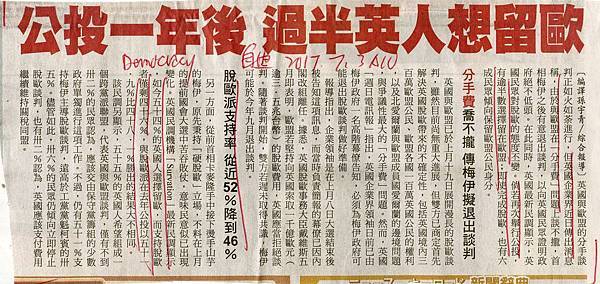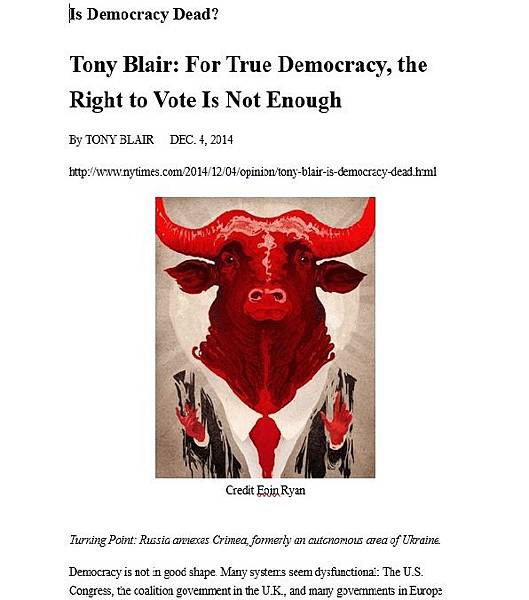公投一年後 過半英人想留歐
孫宇青, 自由時報 , 2017/7/3
http://news.ltn.com.tw/news/world/paper/1115712
What's gone wrong with democracy?
The Economist, March 1, 2014
http://www.economist.com/news/essays/21596796-democracy-was-most-successful-political-idea-20th-century-why-has-it-run-trouble-and-what-can-be-do
Is Democracy Dead?
Tony Blair, The New York Times, DEC 4, 2014
https://www.nytimes.com/2014/12/04/opinion/tony-blair-is-democracy-dead.html
accessed July 10, 2017
■ 一年前多數英國人公投要脫歐。今天多數英國人要留歐。讓人民作決策是最好的辦法嗎?
■ 2014年12月4日英國前首相布萊爾在紐約時報上撰文「民主已死?」
■ 2014年3月1日英國經濟學人發表長文「民主的毛病在哪兒?」
■ 英國是民主先進國家,它的民主出了問題,我們跟進它實行民主又該如何?
林中斌 2017.7.10



英國與歐盟的分手談判正如火如荼進行,但英國企業界近日傳出消息稱,由於與歐盟在「分手費」問題上談不攏,首相梅伊之後有意退出談判,以向英國民眾證明政府絕不低頭。在此同時,英國最新民調顯示,英國民眾對脫歐的態度丕變。倘若再次舉行公投,有逾半數選擇留在歐盟;即使完成脫歐,也有六成民眾傾向保留歐盟公民身分。
分手費喬不攏 傳梅伊擬退出談判
英國與歐盟已於上月十九日展開漫長的脫歐談判,雖然目前尚無重大進展,但雙方已商定首先解決英國脫歐帶來的不確定性,包括英國境內三百萬歐盟公民、歐盟各國一百萬英國公民的權利,以及北愛爾蘭與歐盟成員國愛爾蘭的邊境問題,與爭議性最大的「分手費」問題。然而,英國「週日電訊報」指出,英國企業界領袖日前已由梅伊政府一名高階幕僚告知,必須為梅伊政府可能退出脫歐談判做好準備。
報導指出,企業領袖是在上月八日大選結束後被告知這項訊息,而當時負責簡報的幕僚已因內閣改組離任。據悉,英國脫歐事務大臣戴維斯五月即表明,歐盟若堅持向英國索取一千億歐元(逾三.五兆台幣)的脫歐費用,英國應當拒絕談判。隨著談判開始,雙方若遲未取得共識,梅伊可能於今年九月退出談判,藉此向英國民眾證明,梅伊在「分手費」一事上將強硬到底。唐寧街十號尚未回應此傳聞,但內部消息指出,退出談判不在英方計畫之內。
脫歐派支持率 從近52%降到46%
另一方面,英國去年公投確立脫歐後,政治和經濟前景混沌不明,從前首相卡麥隆手中接下燙手山芋的梅伊,原先秉持「硬脫歐」立場,主張退出歐洲單一市場、拿回移民主導權等,不料在上月的提前國會大選中苦吞敗仗,意味民意似已出現變化。果不其然,英國民調機構「Survation」最新民調顯示,如今五十四%的英國人選擇留在歐盟,而支持脫歐者僅剩四十六%,與脫歐派在去年公投中,以五十一.九%比四十八.一%勝出的結果大不相同。
該民調另顯示,五十五%的英國人希望組成一個跨黨派聯盟,代表英國與歐盟談判,僅有不到卅二%的民眾認為,應該交由保守黨籌組的少數政府單獨進行這項工作。不過,仍有五十一%支持梅伊主導脫歐談判,遠高於工黨黨魁柯賓的卅五%。儘管如此,卅六%的民眾仍傾向立即停止脫歐談判,也有卅二%認為,英國應該支付費用繼續維持關稅同盟,而僅有不到廿四%支持先脫歐、再與各國商討貿易協定的策略。
Turning Point: Russia annexes Crimea, formerly an autonomous area of Ukraine.
Democracy is not in good shape. Many systems seem dysfunctional: The U.S. Congress, the coalition government in the U.K., and many governments in Europe have had difficulty making the decisions necessary to finding a way back to economic growth. Some fledgling democracies seem, in the short term at least, less competent to serve the needs of their citizens than some autocracies are.
Take all this together and add the profound nature of the challenges of recent times — the extremism convulsing whole nations in the Middle East and beyond; the ongoing financial crisis in Europe; the conflict in eastern Ukraine and Russia’s annexation of Crimea — and it is not surprising that we have seen the rise of far-right parties in Europe and a general sense of malaise and disillusionment with democratic politics. Suddenly to some, Putinism — the cult of the strong leader who goes in the direction he pleases, seemingly contemptuous of opposition — has its appeal.
We have become complacent about democracy. It remains the system of choice. It remains what free people freely choose. But it has what I would call an “efficacy” challenge: Its values are right, but it is too often failing to deliver. In a world of change, where countries, communities and corporations must constantly adapt to keep up, democracy seems slow, bureaucratic and weak. In this sense it is failing its citizens. Why has this happened and what should we do about it?
We have forgotten that theories are only as good as they work in practice. So the technical nuts and bolts of democratic systems matter. The basic principle that the people should elect their government remains popular and obviously right, but its implementation seems to have gone awry. It is time to debate how to improve democracy, how to modernize it. Traditionally this debate has been dominated by issues of transparency and honesty, as with, for example, the discussion in the U.K. about expense reimbursements for members of parliament.
But the disillusionment with democratic governments is really about people believing that the changes they need in their lives can’t happen quickly enough. It is a practical challenge. People regularly frame it differently: They say that the government isn’t listening. But often the government is listening — it is rather that the voices that reach officials are saying different things. It is effective decision-making through strong leadership that is the missing element. Why is this?
In recent years, certain changes that have taken place in Western democracies have decreased the system’s efficacy.
In both the U.S. and the U.K., increasingly, as a result of the way constituencies’ boundaries have been drawn, some have fallen into the “ownership” of parties. So if you win your party’s nomination to be the candidate, you win the seat. This pushes would-be candidates to take positions that appeal to the party activists who select nominees, not to the broader public. So politicians have been moving away from the center ground — where the public tends to congregate — to the detriment of policy-making. (CPL: how extremism in politics has been rising)
In such a system, the emphasis is on striking political positions, not on delivering evidence-based solutions. In fact, modern governance is mainly a nonideological business.
In addition, the media in many Western countries have become more partisan as conventional audiences shrivel and news organizations see the best commercial opportunity in roiling their most loyal viewers and connecting with their specific interests.
Then there have grown up powerful interest groups that can stand in the way of substantial and necessary reform. Anyone who has ever tried to reform an education system, for example, knows how tough and bitter a struggle it is. The bureaucracy fights change. The teachers’ unions fight change. The public gets whipped up to defeat change even when it is in the public’s own interest. The nearest I came to losing my job as prime minister was not over policies of war and peace, but over education reforms. The effort to reform health care has similar characteristics.
Yet since the world is changing so fast, updating government systems is essential.
The impact of the lack of reform is felt by the public. People need better services, have higher expectations, but as any politician can tell you, they don’t want to pay more for them. So the absence of reform, particularly in an era of tight budgets, is immensely challenging. Thus you have the curious paradox of modern leadership: There has to be reform to satisfy rising public demands, but the public can be easily mobilized to oppose those reforms. Therefore politicians often back off the change, which then increases voters’ disillusionment with the political process.
Look at European nations like France, Italy, Spain and Greece, which are struggling to reform their tax systems, to change how public benefits are distributed, or to decrease systemic redundancies. The public blowback against reform is intense and yet there really is no alternative. Meanwhile the European Union is unable to take measures to stimulate growth, the essential accompaniment to reform.
Examine the changes in the private sector over the past 20 years. Look at the top companies by market capitalization and how new names have displaced the old. This is the way of the world, except in government. We go along in the same old way — unable to change, due in part to top-down bureaucracies that manage the status quo instead of changing it.
Technology alone could transform the way education and health care work. It could revolutionize learning and teaching. It could create whole new pathways of diagnosis and treatment. In the best places this is happening, but not in most. It is this — the efficacy gap — that is the real cause of political disillusionment and why people go running after populist solutions that aren’t really solutions at all. This is what we need to fix.
Moreover, at the very time when leadership is needed, the gene pool of political leaders has shrunk. How many leaders and, for that matter, followers in a parliament or congress have real-life experience in responsible positions outside of politics? Today it is very common for a young person interested in politics to graduate from university, go to work for a politician as a researcher or political analyst, and then transition straight into an elected position.
I only spent seven years working in the private sector before entering politics, but it was a crucial, formative time. I learned about business and about people in a way that was greatly beneficial when I later came to govern. In particular, I learned the difference between academic political ideas and policies suited to “real world” application.
On top of this — and only an ex-politician can say this — politicians are not really well paid by the standards of those who are successful in the private sector. This restricts the attractions of a political career, at exactly the time when we most need the gene pool of our politicians to be varied, vibrant and vigorous.
The result of all this, for those who then rise to the top position in a democracy, is that it can be hard to get things done — hence the “efficacy challenge.” This challenge is magnified by social media, which is itself a revolutionary phenomenon. Waves of emotion on issues used to build to tidal strength relatively slowly; they now reach tsunami force within days, even hours. Politicians’ desire for impact too often obscures the value of balance.
Political leaders find this quite disorienting. A leader has to calibrate leadership and public opinion, be out in front of it, but not too much so. He or she has to judge sentiment finely, but making this judgment is hard if you’re governing by Twitter feed. Social media is exciting and can effect real and positive change, but it is also the domain of the loudmouth — and those who shout loudest don’t necessarily deserve to be heard most.
The answer to this democratic malaise may be partly a change in the relationship between governing and governed. People have to accept that governing involves difficult choices, and politicians ought to be respected for making them, not abused. It may involve changing the rules — for example, allowing greater interchange between the public and private sectors. It may be that parliaments need to function differently. In some countries, there may even be need for constitutional changes.
The time has come to put this issue squarely on the table. The simple right to vote is not enough: Systems need to deliver results for the people. They do not at present. We should not leave voters with a choice between dictatorship and populism. If we truly believe in democracy, the time has come to improve it.
Tony Blair was prime minister of Britain from 1997 to 2007.


 留言列表
留言列表


